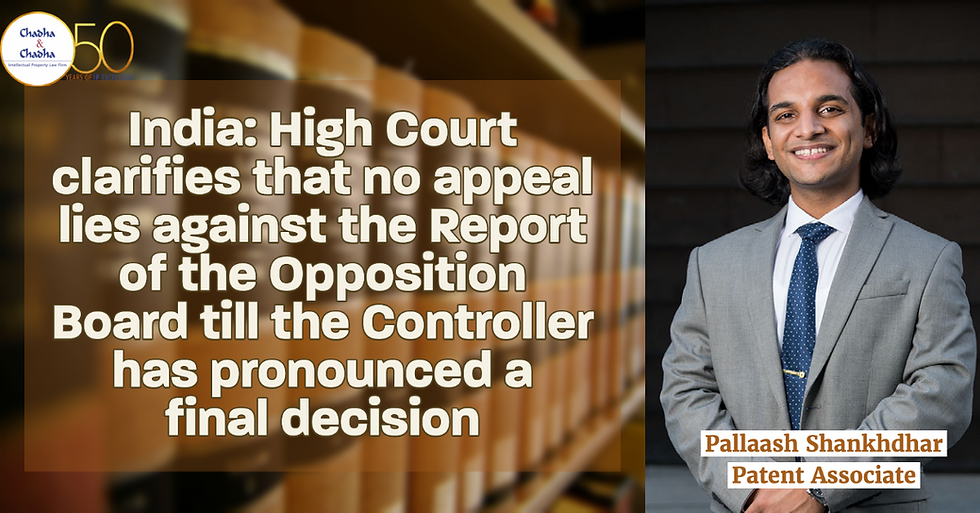High Court: No appeal against the Report of Opposition Board till the final decision is pronounced
- Pallaash Shankhdhar

- Apr 11, 2023
- 3 min read
Introduction:
In a recent order, the Hon’ble Delhi High Court (hereinafter referred to as the “Hon’ble Court”) considered a petition against the recommendations of the Opposition Board in a post-grant opposition proceeding in the case of WILLOWOOD CHEMICALS PRIVATE LIMITED vs. ASSISTANT CONTROLLER OF PATENTS AND DESIGNS & ANR. (W.P.(C)-IPD 15/2023 & CM No. 34-35/2023).
Facts of the case:
The Petitioner {the patent holder of the Indian Patent Number 342004 (hereinafter referred to as the “subject patent”)} filed an appeal before the Hon’ble Court under Articles 226/227 of the Indian Constitution, against the Report/Recommendations of the Opposition Board in respect of an impending post-grant opposition proceedings initiated by Safex Chemicals India Ltd. (hereinafter referred to as “the Opponent”).
Arguments put forth:
· Petitioner’s side:
The Petitioner challenged the Report of the Opposition Board on the ground that the Opposition Board’s recommendations with respect to novelty and inventive step of the subject patent, in view of the cited prior arts, were unfounded in law. It is noteworthy that similar prior arts as those mentioned in the post-grant opposition, were considered during the pre-grant opposition proceedings. Further, the recommendations of the Opposition Board with regards to Section 3(e) of the Act were argued to be unsustainable and untenable.
Furthermore, it was submitted that the Expert Affidavits submitted by the Petitioner were not considered in the Report.
Moreover, the Petitioner submitted that the Opposition Board is required to submit their Report within three months of submission of all the documents in light of Rule 56(4) of the Indian Patent Rules, however, the said report was published after a year’s time from date of filing of documents.
Finally, the Petitioner prayed before the Hon’ble Court that the said Report be quashed and a new Opposition Board be constituted to avoid influence of the impugned report on the Controller.
· Respondent’s side:
The Respondent argued that the present petition under Articles 226/227 of the Indian Constitution, is not maintainable since the Controller is yet to pronounce his final decision under Section 25(4) of the Act.
The Respondent highlighted that since the Report of the Opposition Board is in the form of mere recommendations and do not have a binding force, the Apex Court may not sit in appeal over the same.
Hon’ble Court’s Analysis:
The Hon’ble Court noted the findings of the Supreme Court in the case of Cipla Ltd. vs. Union of India ((2012) 13 SCC 429.), wherein the Supreme Court shed light upon the significance of the Report/Recommendations of the Opposition Board in a post-grant opposition proceeding, but focused on the fact that it is upon the discretion of the Controller whether to rely on or waiver from the said report while pronouncing his final decision under Section 25(4) of the Act read with Rule 62(4) of the Rules.
In view of the above, the Hon’ble Court concluded that the Indian legal framework does not permit an appeal against the Opposition Board’s recommendation or scrutinizing the validity of the Report and declaring it unsustainable. The Act, under Section 117A(2), provides for an appeal once the Controller takes a final decision in the matter. Thus, the Petitioner cannot be permitted to challenge the recommendations of the Opposition Board on merits under Article 226/227 of the Indian Constitution.
Finally, the Hon’ble Court dismissed the petition and directed the Petitioner that since the Controller has not yet pronounced his decision in the post-grant opposition proceeding, the Petitioner is free to raise all contentions raised in the present petition before the Controller, in accordance with the law.

































Comments